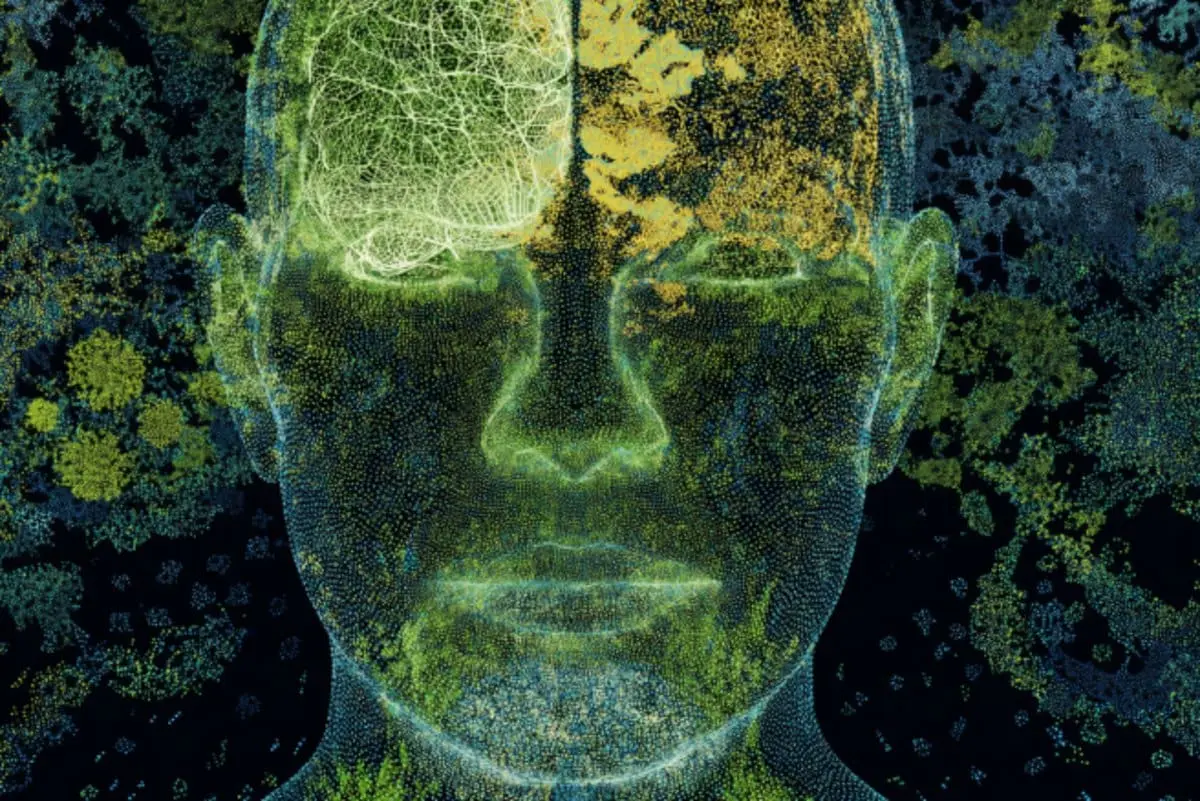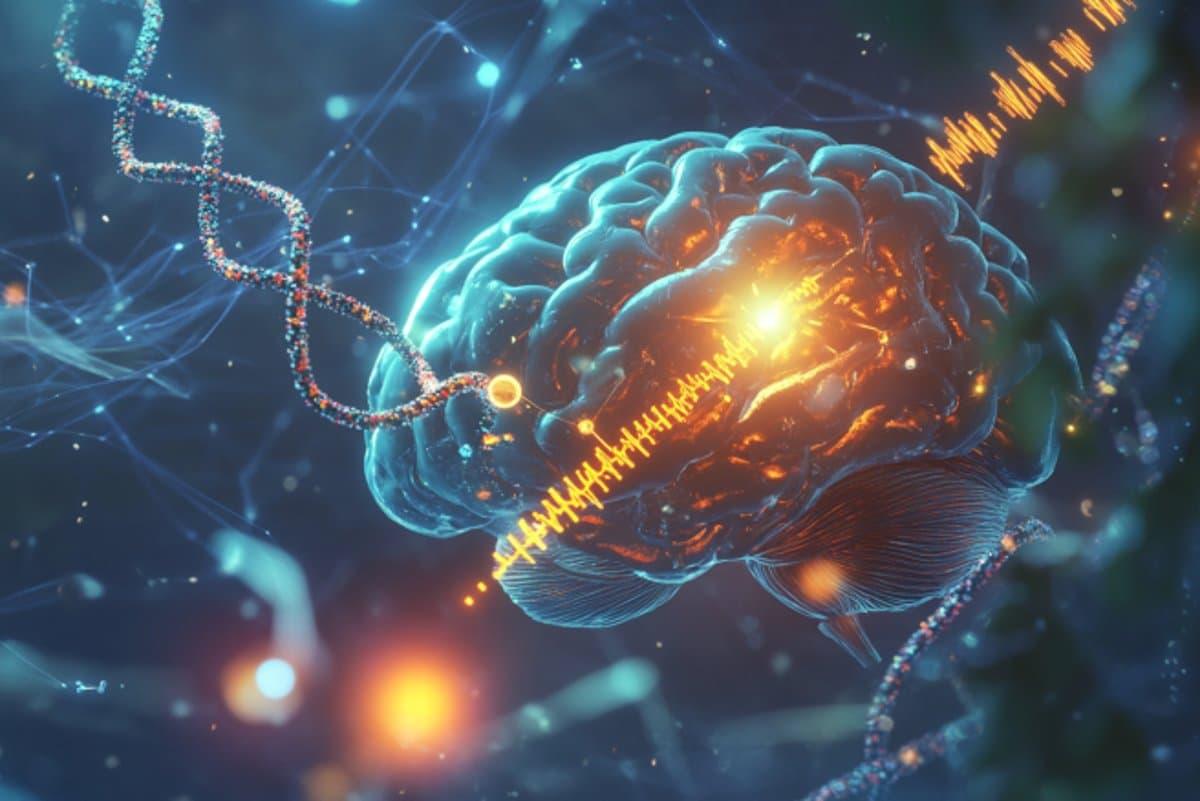AI Algorithm Uncovers Complex DNA Variants Linked to Psychiatric Disorders
2 Sources
2 Sources
[1]
Complex genomic variants are related to psychiatric diseases, study finds
The 3 billion base pairs that constitute the human genome -- the matching jigsaw puzzle pieces of adenine pairing with thymine and cytosine pairing with guanine -- are not just the body's instruction manual. Rearrangements in the order of those base pairs are markers of the origins of disease and of our evolutionary history. They can be simple, when a handful of base pairs switch places. They can also be complex, such as when a stretch of tens of thousands of base pairs inverts and is missing multiple sections. Current state-of-the art techniques for reading out the genome, called whole-genome sequencing, are suitable for finding simple variations but they fall short when it comes to finding complex structural variations. Now a new Stanford Medicine-led study has developed an artificial intelligence-based method capable of identifying complex structural variants from whole-genome sequencing data. The study, which was published Sept. 30 in Cell, created a catalog of complex structural variants using more than 4,000 human genomes from around the globe. These variants often occur in genes governing the brain and were found in regions of the genome linked to human evolution. The researchers also showed that some of the complex structural variants affected how the instructions contained in brain-related genes were read out in the brains of people who had been diagnosed with schizophrenia or bipolar disorder. "This work is a major step forward in figuring out the genetic and molecular basis for psychiatric disorders and suggests that brain-related diseases and in general disorders that have a strong genetic component should have a complex structural variant analysis," said senior author of the study Alexander Urban, Ph.D., associate professor of psychiatry and behavioral sciences, and of genetics. "Any whole genome sequence should be run through this new algorithm; this will allow us to unearth important answers in the data that are currently ignored." Urban and Wing Wong, Ph.D., the Stephen R. Pierce Family Goldman Sachs Professor of Science and Human Health and Professor of Statistics and of Biomedical Data Science, were co-senior authors. The genome in wide angle Almost all the variations that have been discovered in the human genome so far are simple. But the new algorithm's output showed that each genome also has between 80 and 100 complex structural variations. "Looking for only simple variations is like proofreading a book manuscript and searching exclusively for typos that change single letters," Urban said. "You are overlooking words that are scrambled or duplicated, or in the wrong order -- you might even miss that half a chapter is gone. All these things should be caught before the manuscript is sent to the print shop." The Automated Reconstruction of Complex Structural Variants algorithm, ARC-SV for short, catches all kinds of DNA rearrangements and has an accuracy rate of 95% in finding complex structural variants. The algorithm uses an AI model and was trained on dozens of complete human genomes, called pangenomes, from people with diverse ancestry. The algorithm found more than 8,000 distinct complex structural variants, which ranged in length between 200 and 100,000 base pairs. Many variants were located in regions of the genome that regulate brain development and function. The researchers looked more closely at whether these variants were associated with psychiatric disease. Genetics and psychiatric disease The ability to easily find and study complex structural variations could help explain which alterations in the genome lead to psychiatric diseases that are heritable. The study examined two such diseases, schizophrenia and bipolar disorder. Genome-wide association studies, called GWAS, have identified many locations in the genome that carry a risk of being diagnosed with a psychiatric disease. But GWAS results fall short of explaining the genetic risk with enough detail to act on it. "We have made amazing progress in identifying genetic components of psychiatric diseases, but there is still something important missing," Urban said. "GWAS results tell us where in the genome some DNA change related to a disorder is located. But the information from GWAS is somewhat vague. It is like knowing that there are errors somewhere on pages 118, 237, and 304 in a book. But we do not know what kind of errors they are or which words are involved." Urban explained that while GWAS results might direct researchers to look for something wrong on page 118, knowing the sequence of complex structural variants is like having yellow highlighter on the actual 10-word sentence on that page that has one scrambled word and another word duplicated. "It's that exact," he said. The researchers put the output of the ARC-SV algorithm to the test. They used whole-genome sequences combined with measures of gene expression from more than 100 postmortem brain tissue samples from healthy individuals and people who had been diagnosed with schizophrenia or bipolar disorder to investigate what complex structural variations might be doing. The variants tended to be located near or overlapped with GWAS locations known to be associated with the risk of developing schizophrenia or bipolar disorder. The complex structural variants also affected how nearby genes were expressed -- changing the readout of the instructions contained in DNA -- which suggests the variants could be contributing to the disease. "Identifying and studying complex structural variants will give us more understanding of the ways DNA can vary and will provide molecular clues that will allow mapping of the trajectory of biological function that leads to disease and to the treatment of disease," said Bo Zhou, Ph.D., an instructor in psychiatry and behavioral sciences and a first author on the study.
[2]
AI Uncovers DNA Variants Linked to Psychiatric Disorders - Neuroscience News
Summary: Researchers developed an AI algorithm, ARC-SV, to detect complex structural variants in the human genome that previous methods missed. Analyzing over 4,000 genomes, researchers discovered thousands of complex variants, many affecting brain-related genes and linked to schizophrenia and bipolar disorder. These variations, often located in regions critical to brain function, influence how genes are expressed, providing insights into psychiatric disease risk. This breakthrough paves the way for a deeper understanding of psychiatric disorders and new therapeutic approaches. The 3 billion base pairs that constitute the human genome -- the matching jigsaw puzzle pieces of adenine pairing with thymine and cytosine pairing with guanine -- are not just the body's instruction manual. Rearrangements in the order of those base pairs are markers of the origins of disease and of our evolutionary history. They can be simple, when a handful of base pairs switch places. They can also be complex, such as when a stretch of tens of thousands of base pairs inverts and is missing multiple sections. Current state-of-the art techniques for reading out the genome, called whole-genome sequencing, are suitable for finding simple variations but they fall short when it comes to finding complex structural variations. Now a new Stanford Medicine-led study has developed an artificial intelligence-based method capable of identifying complex structural variants from whole-genome sequencing data. The study, which was published Sept. 30 in Cell, created a catalog of complex structural variants using more than 4,000 human genomes from around the globe. These variants often occur in genes governing the brain and were found in regions of the genome linked to human evolution. The researchers also showed that some of the complex structural variants affected how the instructions contained in brain-related genes were read out in the brains of people who had been diagnosed with schizophrenia or bipolar disorder. "This work is a major step forward in figuring out the genetic and molecular basis for psychiatric disorders and suggests that brain-related diseases and in general disorders that have a strong genetic component should have a complex structural variant analysis," said senior author of the study Alexander Urban, Ph.D., associate professor of psychiatry and behavioral sciences, and of genetics. "Any whole genome sequence should be run through this new algorithm; this will allow us to unearth important answers in the data that are currently ignored." Urban and Wing Wong, Ph.D., the Stephen R. Pierce Family Goldman Sachs Professor of Science and Human Health and Professor of Statistics and of Biomedical Data Science, were co-senior authors. Almost all the variations that have been discovered in the human genome so far are simple. But the new algorithm's output showed that each genome also has between 80 and 100 complex structural variations. "Looking for only simple variations is like proofreading a book manuscript and searching exclusively for typos that change single letters," Urban said. "You are overlooking words that are scrambled or duplicated, or in the wrong order -- you might even miss that half a chapter is gone. All these things should be caught before the manuscript is sent to the print shop." The Automated Reconstruction of Complex Structural Variants algorithm, ARC-SV for short, catches all kinds of DNA rearrangements and has an accuracy rate of 95% in finding complex structural variants. The algorithm uses an AI model and was trained on dozens of complete human genomes, called pangenomes, from people with diverse ancestry. The algorithm found more than 8,000 distinct complex structural variants, which ranged in length between 200 and 100,000 base pairs. Many variants were located in regions of the genome that regulate brain development and function. The researchers looked more closely at whether these variants were associated with psychiatric disease. The ability to easily find and study complex structural variations could help explain which alterations in the genome lead to psychiatric diseases that are heritable. The study examined two such diseases, schizophrenia and bipolar disorder. Genome-wide association studies, called GWAS, have identified many locations in the genome that carry a risk of being diagnosed with a psychiatric disease. But GWAS results fall short of explaining the genetic risk with enough detail to act on it. "We have made amazing progress in identifying genetic components of psychiatric diseases, but there is still something important missing," Urban said. "GWAS results tell us where in the genome some DNA change related to a disorder is located. But the information from GWAS is somewhat vague. It is like knowing that there are errors somewhere on pages 118, 237, and 304 in a book. But we do not know what kind of errors they are or which words are involved." Urban explained that while GWAS results might direct researchers to look for something wrong on page 118, knowing the sequence of complex structural variants is like having yellow highlighter on the actual 10-word sentence on that page that has one scrambled word and another word duplicated. "It's that exact," he said. The researchers put the output of the ARC-SV algorithm to the test. They used whole-genome sequences combined with measures of gene expression from more than 100 postmortem brain tissue samples from healthy individuals and people who had been diagnosed with schizophrenia or bipolar disorder to investigate what complex structural variations might be doing. The variants tended to be located near or overlapped with GWAS locations known to be associated with the risk of developing schizophrenia or bipolar disorder. The complex structural variants also affected how nearby genes were expressed -- changing the readout of the instructions contained in DNA -- which suggests the variants could be contributing to the disease. "Identifying and studying complex structural variants will give us more understanding of the ways DNA can vary and will provide molecular clues that will allow mapping of the trajectory of biological function that leads to disease and to the treatment of disease," said Bo Zhou, Ph.D., an instructor in psychiatry and behavioral sciences and a first author on the study. Author: Kimberlee D'Ardenne Source: Stanford Contact: Kimberlee D'Ardenne - Stanford Image: The image is credited to Neuroscience News Original Research: Open access. "Detection and analysis of complex structural variation in human genomes across populations and in brains of donors with psychiatric disorders" by Bo Zhou et al. Cell Abstract Detection and analysis of complex structural variation in human genomes across populations and in brains of donors with psychiatric disorders Complex structural variations (cxSVs) are often overlooked in genome analyses due to detection challenges. We developed ARC-SV, a probabilistic and machine-learning-based method that enables accurate detection and reconstruction of cxSVs from standard datasets. By applying ARC-SV across 4,262 genomes representing all continental populations, we identified cxSVs as a significant source of natural human genetic variation. Rare cxSVs have a propensity to occur in neural genes and loci that underwent rapid human-specific evolution, including those regulating corticogenesis. By performing single-nucleus multiomics in postmortem brains, we discovered cxSVs associated with differential gene expression and chromatin accessibility across various brain regions and cell types. Additionally, cxSVs detected in brains of psychiatric cases are enriched for linkage with psychiatric GWAS risk alleles detected in the same brains. Furthermore, our analysis revealed significantly decreased brain-region- and cell-type-specific expression of cxSV genes, specifically for psychiatric cases, implicating cxSVs in the molecular etiology of major neuropsychiatric disorders.
Share
Share
Copy Link
Stanford Medicine researchers develop an AI-based method to identify complex structural variants in the human genome, providing new insights into psychiatric disorders like schizophrenia and bipolar disorder.

AI Algorithm Revolutionizes Genome Analysis
Researchers at Stanford Medicine have developed a groundbreaking artificial intelligence-based method capable of identifying complex structural variants (CSVs) in the human genome. This new algorithm, named Automated Reconstruction of Complex Structural Variants (ARC-SV), represents a significant advancement in understanding the genetic basis of psychiatric disorders
1
.Unveiling Hidden Genomic Complexities
Current whole-genome sequencing techniques excel at finding simple variations but fall short when it comes to complex structural variations. The ARC-SV algorithm addresses this limitation by detecting a wide range of DNA rearrangements with a remarkable 95% accuracy rate
2
.The study, published in Cell, analyzed over 4,000 human genomes from diverse ancestries, revealing that each genome contains between 80 and 100 complex structural variations. These variants, ranging from 200 to 100,000 base pairs in length, were often found in regions governing brain development and function
1
.Implications for Psychiatric Disorders
The research team, led by Alexander Urban, Ph.D., associate professor of psychiatry and behavioral sciences, and genetics at Stanford Medicine, focused on the potential link between these complex variants and psychiatric diseases, particularly schizophrenia and bipolar disorder
2
.By examining whole-genome sequences and gene expression data from postmortem brain tissue samples, the researchers discovered that many CSVs were located near or overlapped with genome-wide association study (GWAS) locations known to be associated with the risk of developing these disorders
1
.Related Stories
Advancing Genetic Understanding
Urban emphasizes the significance of this work, stating, "This work is a major step forward in figuring out the genetic and molecular basis for psychiatric disorders." He suggests that all brain-related diseases and disorders with a strong genetic component should undergo complex structural variant analysis
2
.The ARC-SV algorithm provides a level of precision in identifying genetic variations that was previously unattainable. Urban likens the difference to "having yellow highlighter on the actual 10-word sentence on that page that has one scrambled word and another word duplicated" compared to the vague information provided by GWAS results
1
.Future Implications and Applications
This breakthrough has far-reaching implications for genetics and psychiatry. Bo Zhou, Ph.D., an instructor in psychiatry and behavioral sciences and first author of the study, believes that identifying and studying CSVs will provide molecular clues allowing for the mapping of biological functions leading to disease and potential treatments
1
.The researchers advocate for running all whole-genome sequences through this new algorithm to uncover important answers in data that are currently being overlooked. This approach could potentially revolutionize our understanding of psychiatric disorders and pave the way for new therapeutic approaches
2
.References
Summarized by
Navi
[2]
Related Stories
AI Tool Maps Genetic Blueprint of Brain's Communication Bridge, Unlocking Mental Health Insights
04 Nov 2025•Science and Research

AI Breakthrough Accelerates Discovery of Genes Linked to Neurodevelopmental Disorders
27 Feb 2025•Science and Research

AI Uncovers New Cause and Potential Treatment for Alzheimer's Disease
26 Apr 2025•Science and Research

Recent Highlights
1
OpenAI secures $110 billion funding round from Amazon, Nvidia, and SoftBank at $730B valuation
Business and Economy

2
Trump orders federal agencies to ban Anthropic after Pentagon dispute over AI surveillance
Policy and Regulation

3
Google releases Nano Banana 2 AI image model with Pro quality at Flash speed
Technology





